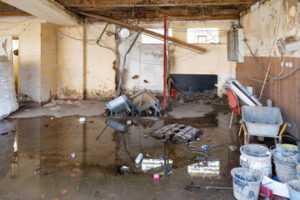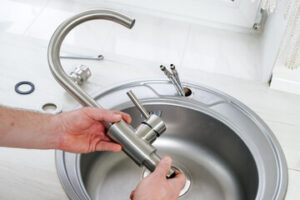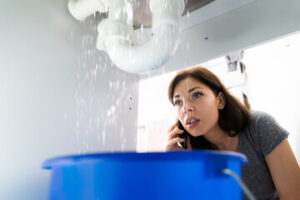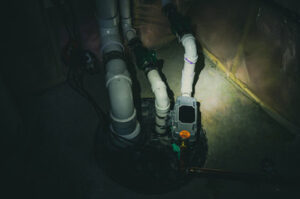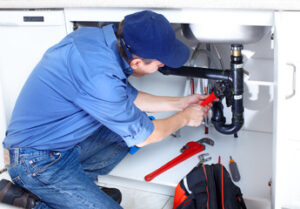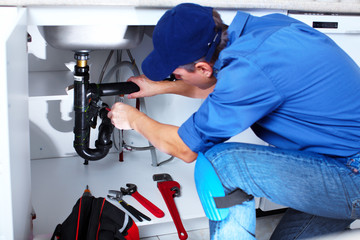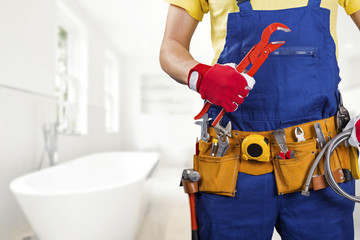Plunger Plumber covers everything that has to do with the pipes and fixtures inside a home. This includes the supply lines that bring fresh water in, drain lines that carry wastewater out, and vents that allow air to circulate through both systems.
Unlike commercial plumbing, which deals with larger buildings that house many customers or employees, residential plumbing services only deal with homes. This can make locating and fixing problems easier for plumbers.

Water supply lines are responsible for bringing fresh, clean water into your home. They carry potable water from a municipal water system or, in rural areas, from private wells. Water supply lines are typically copper or galvanized steel, and they may also be made of plastic. The size of a supply line determines how much water can flow through it at one time. A larger pipe will allow more water to flow, but it may also lead to higher water bills.
As a plumber, you or your clients will use water supply lines in many different types of projects. Whether you’re installing new plumbing for a whole house or just replacing old supply lines, it’s important to understand how they work. This will help you ensure that the job is done correctly and safely, and that it meets local codes.
A residential plumbing system has two primary systems: one brings fresh, clean water into the house; the other removes dirty water and directs odor-causing sewer gasses to the waste management system. The plumbing system also uses drain and vent pipes to connect the two systems and route sewage away from the house. Various pipe sizes and materials are used for these pipes, but there are five common types of residential plumbing pipes that are found in most houses.
The most common type of residential water supply line is the main water line, which delivers water from a public utility company to a property. It’s sometimes called a water service line, and it typically runs from the water meter to the house. The main water line is usually made of copper or galvanized steel, and it’s often buried underground.
Other types of residential water supply lines include faucet supply lines, toilet supply lines, and dishwasher supply lines. These supply lines are responsible for delivering water to appliances in the kitchen, bathroom, and laundry room. For example, a kitchen sink will have a faucet supply line that connects the water supply valve to the faucet. A toilet supply line will connect the water supply valve to a toilet.
The distribution lines transport water from the main line to residential faucets, showers, toilets and other appliances. They must be able to provide the right amount of water to each point of use, resist all external and internal forces, and be durable and long-lasting. Steel, ductile iron, pre-stressed concrete and reinforced plastic are some of the most common materials used for plumbing distribution systems. The distribution lines also must be able to withstand corrosion, which may require special coatings or lining.
Water supply pipes are usually installed in straight lines to facilitate easy water movement and allow each room or area of the house to have its own water source. For example, the cold water supply line in the house is separate from the hot water supply line from the water heater. This arrangement allows hot and cold water to be used in any room without affecting the supply in other rooms.
In many cities, the public water utility’s piping system is connected to the building through the service line or water service pipe. Plumbers are responsible for the upkeep of this portion of the distribution line, as well as any piping in the home that connects to it.
These lines are typically buried in the ground under a layer of soil. The top of the soil is often layered with gravel to help with drainage and prevent erosion. Pipe bedding is also designed to cushion the pipes and protect them from damage due to contact with hard objects, such as rocks.
The service line that connects to a municipal water supply is called a water meter lateral. This is usually a small diameter pipe, whereas the large service laterals for commercial and industrial (ICI) buildings are normally much larger. This is because a commercial or industrial premise plumbing system requires greater water pressure than residential homes to function properly. In these applications, plumbers commonly install a pressure-reducing valve (PRV) to limit the maximum static pressure at fixtures to 550 kPa as specified by the BC Plumbing Code. This is to prevent water hammer, which occurs when the distribution system is supplying excessive amounts of water at one time.
The pipes that carry wastewater away from your home’s fixtures are known as drainage pipes. They pitch, or angle downward, to allow gravity to pull waste water into a sewer line, where it’s carried to the local sewage treatment plant or septic tank. Drainage pipes are important because they prevent basement flooding, soil erosion and damage to structures in a home, and they help keep plumbing fixtures operating correctly.
When it comes to selecting the best drain pipe material for your home, there are a few different options available. Metals, plastics and even concrete offer varying degrees of durability and longevity, so it’s a good idea to consult with a professional when making your decision.
Generally, plumbers favor polyvinyl chloride, or PVC, for residential drainage pipe. This durable, low-cost and water-safe plastic offers superior corrosion resistance. It also requires less maintenance than other pipe materials, and it won’t degrade over time like metal pipes can.
Older homes with galvanized steel drain pipes should consider replacing them with modern PVC pipes. These outmoded metal pipes are prone to rusting, which weakens their structural integrity and impedes water flow. In addition, they often require a zinc coating that can wear off over time.
Steel drain pipes also have a short lifespan, with most experiencing issues within five decades of installation. If you find your galvanized steel pipes are beginning to corrode, call a professional plumber for replacement services.
A plumbing vent pipe – which is not a drain pipe – works in conjunction with your drain pipes to regulate airflow in the system. This helps prevent foul gases, such as those produced when flushing a toilet, from building up inside your home. A plumbing vent can be identified by its open top and bottom. Locate it in the ceiling of your home, especially near kitchens and bathrooms.
While plumbing vents are not a necessity for newer homes, they can be helpful in reducing the frequency of clogged toilets. They work by creating an air passageway that safely carries odors and fumes from drains to the outdoors, where they can be expelled.
Sewer lines are what move sewage out of your home and into the city sewer system or your septic tank, if you have one. These large buried pipes are typically four to six inches in diameter, and they slope downwards to promote the flow of waste and prevent dangerous backflow issues.
Like any other type of pipe, a residential sewer line can wear down and need to be replaced. The best way to know whether yours needs attention is to keep an eye out for a putrid smell, which usually means that a clog is close by. A plunger or chemical cleaner may help with a minor clog, but when it’s time for a full repair, a plumber is your only option.
Your plumber will use one of several methods to replace a sewer line, depending on the type and condition of your existing pipes. Newer homes are more likely to have plastic pipes, while older homes might have clay or cast iron pipes. In some cases, the plumber will simply replace the entire length of the sewer line. Alternatively, he or she might use a technique called pipe bursting to insert a new pipe into the old one. This method is more efficient and less invasive than digging up the whole pipe.
A functional, clog-free sewer line is essential for your comfort. When it’s time to have yours repaired, a professional plumber can ensure the job is done correctly and without damaging your surrounding landscaping. Taking precautions to keep trees away from your sewer line and being mindful of the types and sizes of items you flush down the toilet can also help you avoid costly repairs down the road.
If you’re not sure where your home’s sewer line is located, speak with the previous owner or contact the city to see if they have maps that show the location of underground utilities and sewer lines. It’s also a good idea to have a plumber locate your sewer clean-out point, which is a capped pipe that allows you to remove debris and blockages from the main line outside of your house. This should be located at the lowest part of your property, often near a toilet, tub, or stand-up shower.

